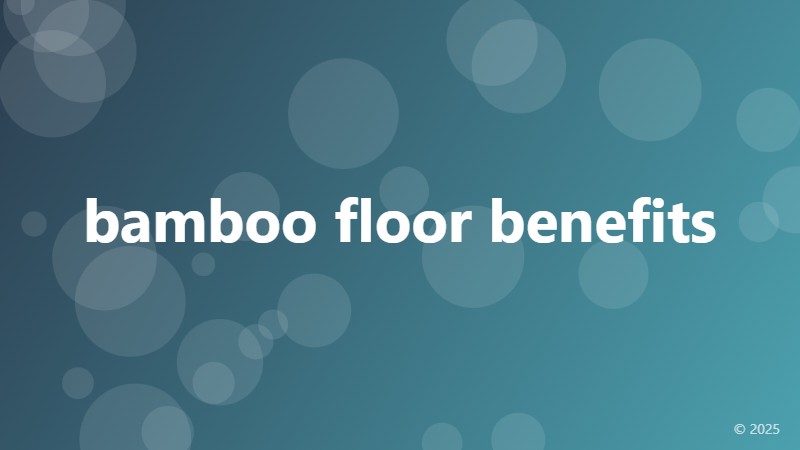bamboo floor benefits

The Eco-Friendly Choice: Unveiling the Bamboo Floor Benefits
When it comes to selecting the perfect flooring for your home, there are numerous options to consider. However, if you're looking for a sustainable, durable, and aesthetically pleasing choice, bamboo flooring stands out from the rest. This eco-friendly alternative to traditional hardwood flooring has been gaining popularity in recent years, and for good reason. In this article, we'll delve into the numerous bamboo floor benefits that make it an attractive option for homeowners and environmentally conscious individuals alike.
Durability and Low Maintenance
Bamboo flooring is renowned for its exceptional durability and resistance to wear and tear. With a Janka hardness rating of 1,300-1,400 pounds per square inch (psi), bamboo flooring is significantly harder than many popular hardwood species, including oak and maple. This means that bamboo floors can withstand heavy foot traffic and are less prone to scratches and dents. Additionally, bamboo flooring requires minimal maintenance, as it can be easily cleaned with a damp mop and does not need to be waxed or polished regularly.
Sustainable and Eco-Friendly
One of the most significant bamboo floor benefits is its eco-friendly nature. Bamboo is a highly renewable resource that can be harvested in as little as three to five years, compared to traditional hardwoods which can take decades to mature. This rapid growth rate makes bamboo a sustainable choice for environmentally conscious homeowners. Furthermore, bamboo flooring is often certified by organizations such as the Forest Stewardship Council (FSC), ensuring that the bamboo is sourced from responsibly managed forests.
Aesthetically Pleasing and Versatile
Bamboo flooring is available in a range of styles and colors, making it easy to find a option that suits your unique taste and décor. From natural and rustic to stained and engineered, bamboo flooring can complement a variety of interior design styles. Additionally, bamboo flooring can be installed in various patterns, including horizontal, vertical, and diagonal, allowing homeowners to create a unique and personalized look.
Improved Indoor Air Quality
Bamboo flooring has natural antibacterial and antifungal properties, which can help to improve indoor air quality by reducing the growth of allergens and microorganisms. This makes bamboo flooring an excellent choice for homeowners who suffer from allergies or respiratory issues. Furthermore, bamboo flooring is resistant to moisture, reducing the risk of mold and mildew growth.
Cost-Effective and Increases Property Value
In addition to its numerous benefits, bamboo flooring is also a cost-effective option. Compared to traditional hardwood flooring, bamboo flooring can be up to 50% less expensive. Furthermore, bamboo flooring can increase property value, making it a wise investment for homeowners. According to the National Association of Realtors, homes with bamboo flooring can recoup up to 80% of the installation cost at resale.
In conclusion, bamboo flooring offers a multitude of benefits that make it an attractive option for homeowners. From its durability and low maintenance requirements to its eco-friendly nature and aesthetic appeal, bamboo flooring is an excellent choice for those looking to upgrade their home's flooring. So why not consider bamboo flooring for your next home renovation project?